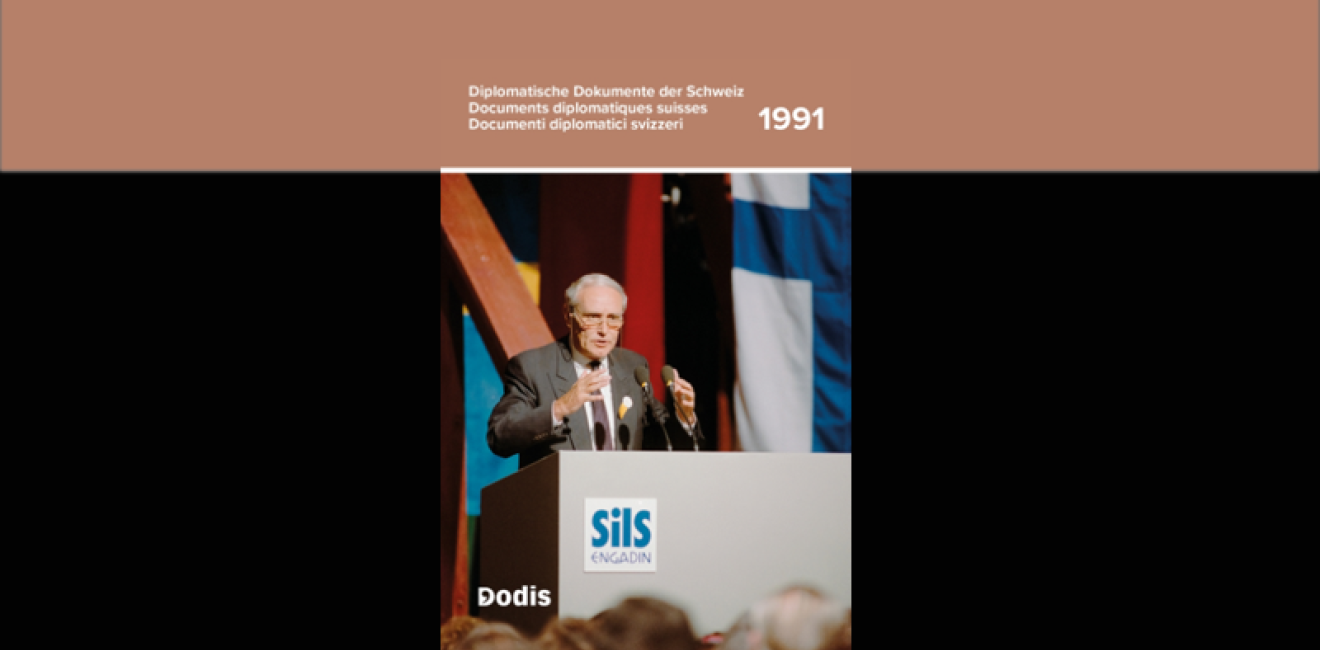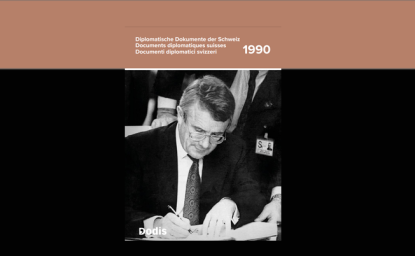The Year 1991 in Swiss Diplomatic Documents
Liliane Stadler offers a look at the latest release of documents from Diplomatische Dokumente der Schweiz (Dodis), which covers the year 1991 in Swiss diplomatic history.

A blog of the History and Public Policy Program
Liliane Stadler offers a look at the latest release of documents from Diplomatische Dokumente der Schweiz (Dodis), which covers the year 1991 in Swiss diplomatic history.

There are few archival research groups that publish recently declassified archival materials as swiftly as the Swiss research center Dodis does.
In French, Dodis stands for Documents Diplomatiques Suisses, meaning Swiss Diplomatic Documents. It is a research institute of the Swiss Academies of Arts and Sciences devoted to the study of Swiss foreign policy and international relations.
In January of this year, Dodis released the second volume in a series of diplomatic documents dating from 1990 to 1999. Similar to its preceding volume, the current Diplomatic Documents of Switzerland (DDS) – 1991 was published on 1 January, 2022, the very moment that the federally mandated 30-year classification rule expired. It contains 62 carefully selected archival records from the Swiss government, parliament, and federal agencies. Another 1,700 records were simultaneously uploaded onto the Dodis website, along with scans of the original source material and associated metadata.
The aim of the series as a whole is threefold: To encourage systematic research into the most recently accessible holdings of the Swiss Federal Archives, to provide an overview of the most important developments in recent Swiss diplomatic history, and to make a constructive contribution to public discourse on Swiss foreign policy both within and beyond neutral Switzerland. For readers and researchers abroad, these documents may also serve as a useful starting point to cross-reference developments in countries that do not declassify or publish foreign policy documents as swiftly as the Swiss do. What is more, in recent years, Dodis has begun to make an active effort to place Swiss history into a global context (rather than just a national or regional context), and the present selection of documents continues this trend.
1991 was a turbulent year for countries around the globe, and Switzerland was no exception. Following the collapse of the Soviet Union and the re-unification of Germany, the future of Eastern Europe and the violent disintegration of Yugoslavia led to widespread uncertainty in Switzerland’s immediate vicinity. Meanwhile, having adopted economic sanctions against Iraq after the invasion of Kuwait in 1990, the Swiss government came under increasing pressure to position itself anew as a permanent neutral in what was beginning to look like an uncertain post-Cold War international order.
Similar to what it had done during the early post-war period, the Swiss government initially turned to the provision of humanitarian aid and neutral good offices. In Afghanistan, Swiss officials attempted to negotiate a peaceful government transition (http://dodis.ch/57737). In the Western Sahara (dodis.ch/58732), they contributed medical aid and played leading roles in the United Nations (UN) Mission for the Referendum in Western Sahara (MINRUSO). Finally, Switzerland became a driving force for action at the CSCE with regards to events unfolding in the Balkans and took in a substantial number of Yugoslav refugees in 1991 (dodis.ch/57983; dodis.ch/57954).
DDS 1991 offers a compelling selection of recently released archival documents that enable researchers, students, and interested members of the public to review and engage with these developments. It similarly offers documents on the looming question of Switzerland’s relationship with the EC and the EEA during the run-up to the Maastricht meeting of 1992, as well as on Switzerland’s long-standing and complicated relationship with the UN and its various specialized organizations.
The selection of documents in the present volume also raises several fundamental questions with regards to Switzerland’s role in the immediate post-Cold War system as a permanently neutral state. Was Switzerland a pro-active or a reactive actor in its bilateral and multilateral relations during this period? Did Swiss policymakers pursue a clear set of goals and aims in the domain of neutral foreign policy following the end of the Cold War? How did they see Switzerland’s role in its new surroundings? Did they embrace the end of the Cold War? Did they see a need for change?
Some of these questions can be answered with the new Dodis volume, and even for the questions that cannot be answered, researchers will nevertheless find the beginning of a trail of documents that extends beyond the volume itself and further into Dodis’ extensive digital repository.
The extent to which Switzerland’s response to the end of the Cold War varied from the responses of other neutrals is another interesting line of inquiry prompted by this Dodis volume. Throughout the Cold War period, permanently neutral states such as Switzerland, Finland, Sweden, Ireland, and Austria were rarely known to coordinate their foreign policies. Judging by the present volume, this trend appeared to continue into the early stages of the post-Cold War period, as the neutrals varied widely in their foreign policies during the early 1990s. While Ireland had already joined the EC in the 1970s, Sweden, Austria and Finland eventually joined the European Union in 1995, leaving Switzerland as the most prominent permanent neutral in Europe not to join.
In this respect, the volume also addresses a number of still unresolved issues in Swiss foreign policy. Switzerland’s relationship to the EU, its role at the UN (which it joined in 2002) and its ability to provide good offices and humanitarian aid as a permanent neutral all form part of Swiss public discourse today. The volume sheds light on the important relationship between public discourse and Swiss foreign policymaking more broadly. As such, the volume remains highly relevant especially for those interested in understanding the deeper complexities of the relationship between domestic and foreign policy in a direct democracy.
Those looking for further information on this and related subjects are advised to access Dodis’ online database, which is linked to the present volume in multiple ways. All of Dodis’ edited volumes have been made accessible online under Open Access rules since 1997 and up to 33,000 digitalized archival documents are stored on the site, spanning the period from 1848 to the present. Those documents dating from 1991 that were not made available to Dodis for inclusion in the present volume despite freedom of information access requests are listed in the appendix and the Dodis website is regularly updated to reflect when these documents become available.
Overall, this volume is a very thoroughly researched, meticulously assembled and highly valuable contribution to research on the contemporary history of Swiss foreign policy.


A leader in making key foreign policy records accessible and fostering informed scholarship, analysis, and discussion on international affairs, past and present. Read more



